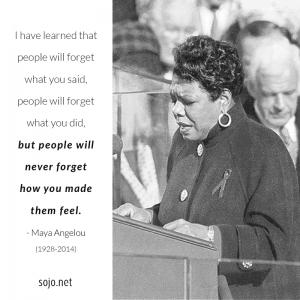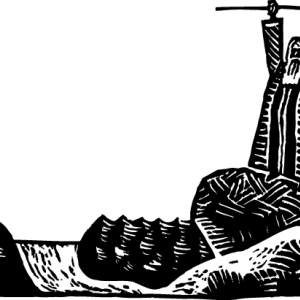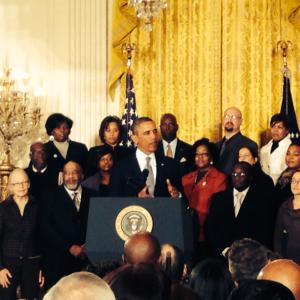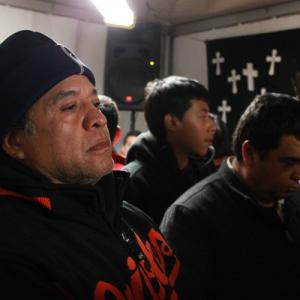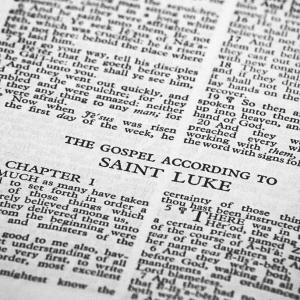
Lisa Sharon Harper, a former Sojourners columnist, is the founder and president of Freedom Road and author of Fortune and The Very Good Gospel. You can follow her work at lisasharonharper.com.
Posts By This Author
Founding Mothers: Remember the Women
I love the 4th of July! It’s coming around again quickly, and I’m seriously deciding where I’m going to be based on which city has the best fireworks. I know. It’s a little crazy for someone who preaches about peace to yearn for a celebration attached to a war. But there’s something about the 4th that reminds me of the sacrifice that freedom requires in our fallen world.
Growing up our family would pack up the van (or minivan as we got older) and make the pilgrimage to the beach in Cape May, N.J. They knew how to do fireworks. Spectacular! Later, in college, while on summer mission project in New York City, I watched the Macy’s celebration from a rooftop on Roosevelt Island — choreographed fireworks as they played the Star Spangled Banner on the radio! I wept. To this day, I shed a tear when I imagine the moment when the rocket's red glare, the bombs bursting in air, gave proof through the night that our flag was still there. It gets me every time.
But, recently I stopped and thought for a minute: “Why is it that, when I think of the founding of our nation, the faces I see in my mind’s eye are all men (with the exception of Betsy Ross)?”
Schuette vs. the Image of God
IN 2006, A MAJORITY of Michigan voters amended their state constitution to outlaw the use of race in college admissions. Supporters of affirmative action challenged that amendment in court; in April, the U.S. Supreme Court (in a case known as Schuette vs. Coalition to Defend Affirmative Action) affirmed Michigan’s right to ban the use of affirmative action by public universities.
Justice Sonya Sotomayor issued a 58-page dissent with a blistering critique of the court’s ruling. Sotomayor pointed out the illogic of the majority opinion that the case was about the voters’ right to self-governance. “This case,” she wrote, “is about how the debate over the use of race-sensitive admissions policies may be resolved ... that is, it must be resolved in constitutionally permissible ways.”
Sotomayor explained in her dissent that “by permitting a majority of the voters in Michigan to do what our Constitution forbids, the Court ends the debate over race-sensitive admissions policies in Michigan in a manner that contravenes constitutional protections long recognized in our precedents.” In other words, if we allow the majority to rule without limits, then affirmative action is effectively dead.
In Remembrance: Maya Angelou
When I heard the news I wept.
“Renowned Poet and Author Maya Angelou Dies at 86,” read the NBC News headline.
My fruitless effort to hold back tears was proven vain as I made my way into the bowels of a D.C. Metro station — tears streaming. I felt silly.
“Why am I crying,” I thought. “I didn’t know Maya Angelou.” I met her once, but she wasn’t family or a close friend, yet I was reacting with the same profound sense of loss, as if my own beloved great grandmother had passed?
The New York Times called her a “lyrical witness of the Jim Crow South” in the headline that announced Ms. Angelou’s death this morning. But for nearly four decades Dr. Maya Angelou served as a kind of great grandmother of the African-American community — a bridge between the ancestors and us.
Moses Rising
In one of the screen-saved memories cataloged from my childhood, I sit in the living room, cross-legged, chin supported by two fists, staring up at moving pictures flashing across a small screen. On network television — because we didn’t have cable back then — Moses (aka Charlton Heston) led thousands of his people out of captivity. They just walked out of Egypt — streams of them. And then they reached the Red Sea.
The Egyptian army was at their back, pressing in. In that moment, though they had left captivity, freedom was not a done deal. They still had to cross over. They were still at war. They still had to outrun an army trained to kill or enslave them again.
Heston — I mean Moses — stood straight-backed on the bank of the Red Sea. He lifted his staff and put it down at the edge of the water, and a miracle took place in living rooms across America. The sea parted. I’ll never forget that moment. This moment was crafted before the digital era — before Disney’s Prince of Egypt, even before Star Wars, and yet it was still awe-inspiring. My eyes focused like lasers watching whole families cross a sea on foot.
Moses led. He was not a king. He was a foster child. He was not from the dominant culture. He was from an enslaved people. He was not a great orator. He stuttered, but he led anyway. He said “Yes” to God’s call and leaned into it. And because he did, the people were set free.
The Expectation Deficit
RECENTLY, the U.S. celebrated the 60th anniversary of the landmark Supreme Court case Brown vs. Board of Education that declared unconstitutional state laws establishing separate public schools for black and white students. By winning the Brown case, Thurgood Marshall broke the rock-hard foundation of racial barriers between black and white schools in the U.S.
But the civil right of equal opportunity for equal education never ensured the human right of equal access to it. Thus the explicitly racial divide, reinforced by law, was replaced by a close kin: the poverty divide, reinforced by economic blight entrenched by white flight to the suburbs.
Ten years later President Lyndon B. Johnson took a bulldozer to that new economic divide by declaring, in his January 1964 State of the Union address, an unconditional “War on Poverty.” He said, “Let this session of Congress be known as the session which did more for civil rights than the last hundred sessions combined.” And it did.
EVERY WAR HAS multiple fronts. Johnson’s fight against poverty was a legislative one, which played out in states, cities, and school districts across the country. Within two years Congress had passed the Civil Rights Act, the Food Stamp Act, the Economic Opportunity Act, and the Social Security Act. Each act was a legislative beachhead in the assault against U.S. poverty.
The Elementary and Secondary Education Act of 1965 represented a major shift in the way the U.S. conceived public education. In this act, Johnson took direct aim at the economic infrastructure that barred blacks and other impoverished people from accessing equal education.
Donald Sterling: Façade, Fiction, and Forgiveness
I almost felt sorry for Donald Sterling when I listened to the original recording of an alleged argument between him and his ex-girlfriend, V. Stiviano, released by TMZ Sports on Saturday. The argument centers around Stivianio’s friendship with black and Hispanic people. The desperation in Sterling’s alleged voice is palpable as he tries to scurry like a cockroach exposed by the light, but doesn’t get away.
The day after TMZ released the recording, Deadspin released an extended version of the tiff with transcript included. In this recording, the cockroach is caught for examination under the proverbial glass. From the Deadspin report:
V: I don't understand. I don't see your views. I wasn't raised the way you were raised.
DS: Well then, if you don't feel—don't come to my games. Don't bring black people, and don't come.
V: Do you know that you have a whole team that's black, that plays for you?
DS: You just, do I know? I support them and give them food, and clothes, and cars, and houses. Who gives it to them? Does someone else give it to them?...
Sterling does not “support them.” He pays them for work. He does not “give them food.” He gives them a wage for employment. He does not give his players “clothes, and cars, and houses.” The Clippers Corporation signs a paycheck, made possible by advertising dollars and ticket sales attracted by the highly skilled labor of the mostly black and brown Clippers players themselves.
Turning Toward Pentecost: Remembering the Women
The women were there at the foot of Jesus’ cross.
The women were there when they laid him in the tomb.
The women walked through the desolate graveyard in the darkest hours of the night — the hours just before dawn, carrying sweet spices prepared to anoint Jesus’ dead body for proper burial. But they never got the chance.
They witnessed the earthquake, talked to the angel, and ran to the other followers announcing the resurrection of their beloved.
And Jesus’ mother, Mary, huddled in the upper room praying with the other women and the rest of the disciples in the days following the resurrection. Until that day, 50 days later, when tongues of fire fell on them all and Peter reminded the crowd of Joel’s ancient prophecy: “Your sons and daughters will prophesy.”
From the cross to the upper room, the women are lifted up! As the church stands in the light of Easter Sunday and now sets its face toward Pentecost, let us remember the women. And, as we do, let’s also remember the women in our pews and surrounding communities — the challenges, fears, and the very real dangers women face every day.
Immigration and Resurrection
I was traveling to Culpeper, Va., on the #Fast4Families bus tour to speak to a group of workers assembled at St. Luke’s Lutheran Church. As we looked out the window we were struck that every 50 feet there stood a plaque marking the place where another significant battle took place in the Civil War.
As we sat down in the church, I didn’t know what I was going to say to all-immigrant group. My message up to that point had focused on mobilizing non-immigrants to join the movement. What could I say to this immigrant gathering?
I prayed. I asked God, “What do you want to speak to this group through me?’ And the dots started to connect.
The Criminality of Blackness
There is a moment in John Steinbeck’s classic, East of Eden, when readers witness the transformation of a stereotype into a human being.
Set in Salinas Valley, Calif., around the turn of the 20th century, Samuel Hamilton picks up Lee, his friend's Chinese servant. Lee wears a queue and speaks Pidgin English. Moments after meeting him, Hamilton learns that Lee was born in the U.S. and asks why he still can’t speak English.
Lee’s face and eyes soften and he speaks perfect English, explaining that he speaks Pidgin for the whites in town to understand him. Lee says, “You see what is, where most people see what they expect.”
Did you catch that? Lee plays the role of the foreigner in order to be seen and understood.
Listen for the Groaning; Then Worship!
And as I worshiped I realized creation wasn’t singing with me. I had entered into creation’s ongoing worship of God!
But Scripture speaks of another utterance of nature — a groaning. (Romans 8:19-22) Even as creation worships, it bears the weight of our sin. Our addiction to consumption, our oil drills and oil spills, and our depleted uranium bullets whizzing through theaters of war in countries ravaged, torn apart — both the people and the land. Creation is groaning, even as the trees lift their branches heavenward in worship.
The Genesis 2 story of creation offers a profound picture of humanity’s relationship with the rest of creation in the beginning. In Genesis 2:15 God called humanity to till and keep the Garden of Eden. The Hebrew word for “till” (‘abad) is also translated “to serve” (as a bond servant). The Hebrew word for “keep” (shamar) is most accurately translated “to protect.” Thus, we were called to serve and protect the rest of creation. In the very beginning of our existence, we related to the land as its servants — its protectors. That relationship was full of care, nurture, security, and selfless service.
Enduring Family Values
NEARLY 50 YEARS ago, the U.S. Department of Labor issued one of the most controversial and influential reports of our time, “The Negro Family: The Case for National Action,” aka “The Moynihan Report,” named after its author Daniel Patrick Moynihan. The March 1965 report offered our nation’s first comprehensive look at the roots of poverty in the African-American community 100 years after the Civil War. The picture wasn’t pretty.
Pointing to black poverty’s roots, Moynihan started with the hell that was the U.S. slave system: “American slavery was profoundly different from, and in its lasting effects on individuals and their children, indescribably worse than, any recorded servitude, ancient or modern.” Going on to quote Nathan Glazer, Moynihan illuminated the absolute powerlessness and dehumanization of enslaved black people under antebellum law and within the social structures of slavery.
Moynihan went on to examine the impact of the Reconstruction period, urbanization, unemployment, and inequitable wages on African Americans’ economic station in U.S. society. He concluded that the single greatest result of these forces was black families’ demise. And the single greatest result of this demise was entrenched poverty, according to Moynihan.
A 2013 Urban Institute report, “The Moynihan Report Revisited,” reflected that in the early 1960s Moynihan was alarmed that 20 percent of black children lived in single parent households with their mothers (not their fathers), but by 2010, 20 percent of white families lived in such households while 53 percent of black children were being raised by their mothers. According to the Urban Institute, fatherlessness in the U.S. has gotten worse, and it is no respecter of race.
Marked with Ashes and Bearing the Cross
With the exception of “WWJD” bracelets, there are few times when outward physical appearance reveals Jesus followers in the public square. Other religions often require their faithful to move through the mundane activities of life outwardly proclaiming the core of their faith. For the traditional Hindi it is the saree or the sherwani. For the Muslim it may be the kurta or hijab; for the traditional Jew the yamaka or headscarf. Every day around the world these men and women move through life, often in cultures unlike their own — marked.
Once a year the global body of Christ reveals itself to the world en masse. Foreheads marked with ashes, the global church moves through the first day of Lent with the sign of the cross in plain view for all to see. In the midst of the mundane, those ashes blend with sweat and soot and reveal to the world just who is a follower of Jesus in their midst.
It is a profound feeling to move through the streets of Washington, D.C., New York, Los Angeles, Cincinnati, or Huntsville, Ala., with your deepest beliefs marked on your forehead.
The Lenten mark of the cross, in tangible form, brings the church into solidarity with Jesus’ 40-day struggle in the wilderness — the place of desolation, the place of waiting and wandering, temptation, and confrontation with the limitations of our human-ness.
What Kind of World Is This?
SNAP began in 1964 when President Lyndon B. Johnson signed the Food Stamp Act as part of his unconditional “War on Poverty.” In his remarks upon signing, Johnson said: “I believe the Food Stamp Act weds the best of the humanitarian instincts of the American people with the best of the free enterprise system. Instead of establishing a duplicate public system to distribute food surplus to the needy, this act permits us to use our highly efficient commercial food distribution system.”
Johnson continued: “It is one of many sensible and needed steps we have taken to apply the power of America's new abundance to the task of building a better life for every American.”
Imagine. Fifty years ago the Food Stamp Act was viewed not as charity, but rather as an ingenious utilization of American enterprise in order to help “build a better life for every American.”
And it is genius.
Unemployment, the Vote, and Hope
I stood in line and waited until they called my number.
“Neeeext,” the woman behind the counter called!
The woman put out an energy that dared anyone to cross her, challenge her, even speak to her. She gave me a pile of papers to fill out “over there,” she waved her hands dismissively in the general direction of all the other losers sitting in rows of old school desks — the kind where the chair and the desk are attached. They were all fully engrossed in one task: filling out their unemployment insurance applications. I joined them.
Of course we weren’t losers, but it felt like we were. We were grown adults. We represented many races: white, black, Latino, and Asian. We represented a small fraction of the sea of people who were out of work at the height of the economic crisis. If you had come to us only weeks before we were school teachers and firemen, opera singers, Wall Street brokers, and justice advocates (like me). But now we were all numbers, experiencing the same humiliating moment together.
But, how much more humiliating it would have been to be thrown out of my apartment? How much more dehumanizing would it have been to become homeless or go without food?
A Fast for Families
IT WAS LIKE the end of the movie Lincoln. In an instant, one whole side of the House of Representatives turned, looked up at the five core fasters from the Fast for Families and erupted in overwhelmingly spirited applause. The applause reverberated throughout the chamber for what seemed like an eternity, though it was really only minutes. Ah, but what grand minutes. I wept. My body, standing there in the gallery, could not contain it.
The Fast for Families: A Call for Immigration Reform and Citizenship was launched on Nov. 12 with core fasters abstaining from all food and drinking only water. Based in a tent on the National Mall, only a few hundred yards from the Capitol building, the fast was sponsored by nearly 40 church and labor organizations and garnered support from more than 4,000 solidarity fasters across the U.S. and around the world. Our goal: To move the hearts and compassion of members of Congress to pass immigration reform with a path to citizenship.
In the Capitol building on Dec. 2, during the hour before the startling ovation, Eliseo Medina (the leader of the fast, which had reached the end of its 21st day on that Monday evening), D.J. Yoon (executive director of NAKASEC, a Korean-American advocacy agency), Cristian Avila (from Mi Familia Vota), and I received House member after member who’d come to visit us in the gallery to say “thank you for your sacrifice.” All the faces and names you usually see flashed across the screen commenting on the events of the day on cable television shows—they came to us, standing in the flesh, shaking our hands, grateful and concerned for our health.
The Power of Fasting
Do you believe in the spiritual realm? I mean really believe; not in your head — in your disciplines?
Do you believe that spiritual power can alter, transform, or even redeem social, institutional, structural and even legislative power?
I’ve been thinking a lot about this lately. I’m not sure I really believed … until recently.
On Sunday mornings, in the midst of our safe sanctuaries, our five-song worship sets, our 15-minute sermonettes and our one-hour services that can be timed with an egg timer, how does our worship and our practice offer witness to the reality of the spiritual realm? How do our disciplines engage the inner world beyond the good feeling we get from songs that comfort us? Comforting songs are valuable in our worship. In fact, God uses those songs to remind us of the ways the Holy Spirit interacts directly with us, knows us, and knows our most intimate needs. But how does our worship — how do our congregations’ spiritual disciplines strengthen our understanding and engagement with the powers, the principalities, and the world beyond our own homes and sanctuaries?
“For our struggle is not against enemies of blood and flesh, but against the rulers, against the authorities, against the cosmic powers of this present darkness, against the spiritual forces of evil in the heavenly places” (Ephesians 6:12).
Fast for Families: Day 18 — Fasting While Others Feast
I moved into the fasting tent Wednesday morning, Day 16 of my Thanksgiving Fast4Families. I’m now able to drink only water. Committed to fast as long as my body holds out.
The rain Wednesday mixed with snow pelted the tent from all sides. Sometimes the whole tent even swayed in the wind. The fasters sat in their chairs, some having just arrived, a few having lived in the same chair for 16 days now.
We’ve had multiple visitors; a Spanish language television station, a former senator’s top aide who is also the father of one of the fasters, another television station, and a crew of photographers that took our picture for a Thanksgiving Tweet. All that before 2 p.m. on Wednesday.
But the best part has been the fellowship and the discipline of silence.
Day 13 and 14: Fasting Is Our Cross
(Editors Note: This post continues updates from Lisa Sharon Harper, director of mobilizing for Sojourners, as she experiences the "Fast for Families: A Call for Immigration Reform and Citizenship," taking place on the National Mall.)
Entering Day 13 of my #Fast4Families. Day 12 was holy ground for me — a crossroads. I woke up that morning sensing God's call to move back into the tent during Thanksgiving week and through Thanksgiving weekend. I did that for the first two days and it was hard on my body. When I left the tent and went back to work, I continued the fast by drinking homemade clear vegetable broth twice a day and fruit juice in the morning. That made it possible for me to continue the fast and still work.
But now, we're talking about Thanksgiving week. There's no need to worry about being able to work. Sojourners office will be pretty much closed from Wednesday through the weekend. I talked with one of the leading organizers of the #Fast4Families tent yesterday. I told her I'm considering moving into the tent for the week, but I'd need to be able to take V8 a couple of times a day. This was her response: "In order to maintain the integrity of the fast that we have run so far, we can only allow water only fasting while in the tent."
Only 19 Percent Are Women
Last week, a controversy erupted over Twitter when it came to light that a prominent evangelical conference with 110 speakers only had four women on stage.
Journalist Jonathan Merritt, did a quick informal study and discovered that out of 34 prominent evangelical conferences, only 19 percent of speakers at plenary sessions were women.
This is a problem.
As a white male evangelical and a black female evangelical who spend a lot of time speaking at conferences, events, and college campuses, we know from experience this is a problem.
Conference spaces have become one of the primary discipleship spaces for evangelicals. These are the spaces where evangelicals go to learn all that it means to be a follower of Jesus.
Advent: Fasting for the Reign of God
There is an awesome moment in the opening chapter of the book of Luke where the writer frames his gospel as an epic celestial battle taking place in the heavenly realm: This is the story of the reign of men vs. the reign of God.
Luke makes it clear. What happened in these pages began in the days of King Herod of Judea (Luke 1:5). King Herod was a product and protector of empire. His father was appointed procurator of Judea by Julius Caesar. He subsequently appointed Herod military prefect of Galilee. After the death of Julius, Antony, and Octavian, Augustus Caesar favored Herod and gave him the name "king of the Jews," eventually becoming governor of Judea.
Herod was most concerned with maintaining his power — at all costs. He built the Roman Empire at his own people's expense. He built great monuments and structures, including the reconstruction of the Jerusalem Temple, enslaving his own people to do it. He used the Jews' labor to erect temples to pagan deities, and, paranoid of anyone who might usurp his power, Herod schemed against his own family, executing three of his own sons for insurrection — one only a few days before his death.
Enter a priest named Zechariah and his wife, Elizabeth.


